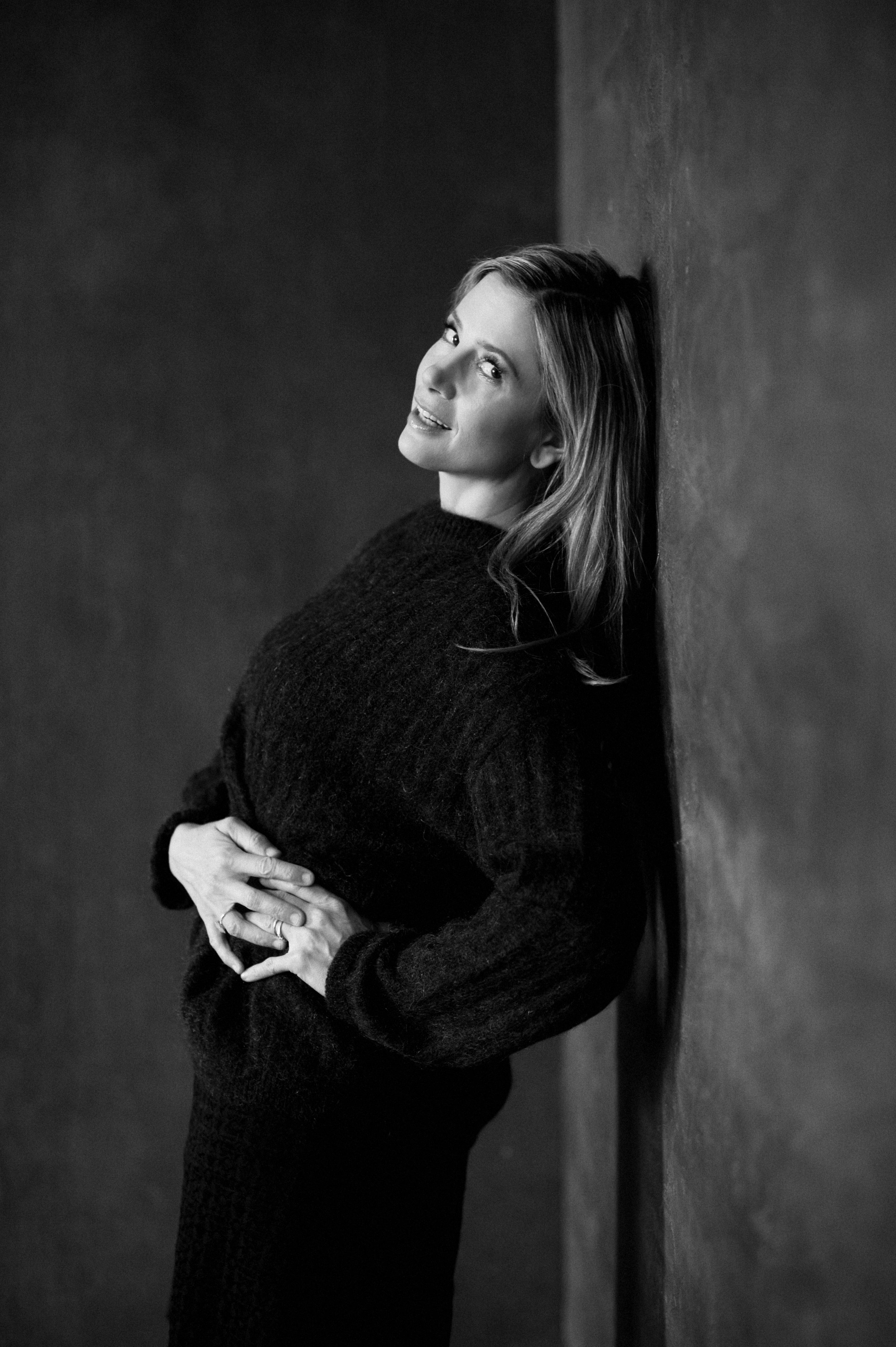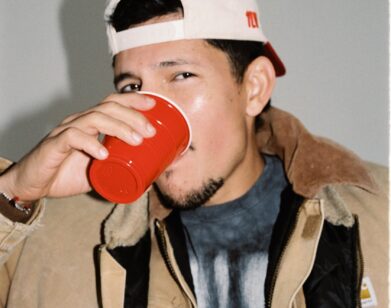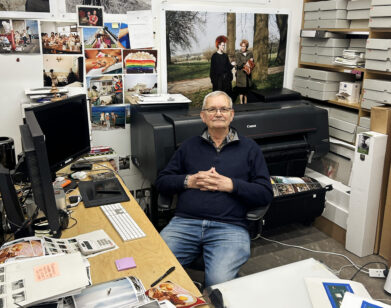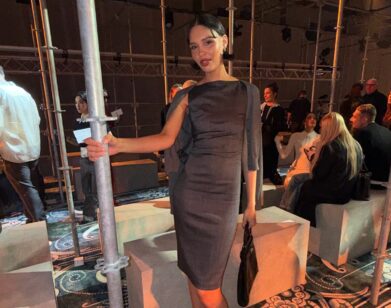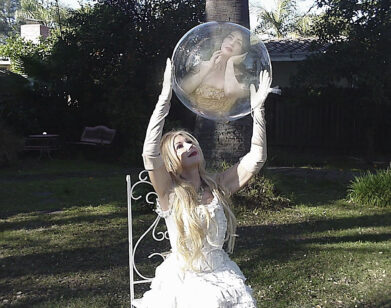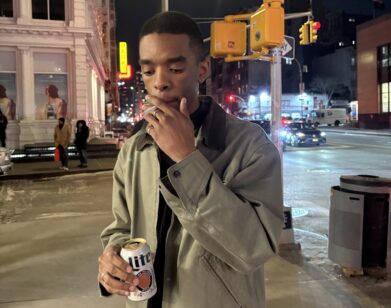Inside Mira Sorvino
ABOVE: MIRA SORVINO AT TEN TON STUDIO IN BROOKLYN, NEW YORK, JULY 2014. PHOTOS: SHAWN BRACKBILL. STYLING: CHLOE HARTSTEIN. HAIR: THOMAS DUNKIN. MAKEUP: KIM BOWER.
“It’s a mystery,” says Mira Sorvino of Intruders, her new BBC America show, which premieres this weekend. Created by Glen Morgan, a former writer and producer of The X-Files, and based on the book by Michael Marshall, Intruders is certainly mysterious. The first episode opens in 1990, with a young girl named Donna committing suicide after receiving a visit from two men (one of whom is James Frain). Among her final words are “I am not Donna.” Then, the show jumps to the present day: a retired police officer-turned-author played by British actor John Simm notices his wife Amy (Sorvino) is acting unusually morose; a man broadcasts conspiracy theories under a code name from an isolated trailer; a little girl is playing alone on the beach. “The audience is in the same position as the lead character in that they don’t know what the hell is going on in the first episode,” explains Sorvino. “Then it slowly starts to make more sense. By the third episode, you have a lot more of a handle of what’s actually happening.”
Although Sorvino has been acting for over 20 years, Intruders will be her first television show as a series regular. “I was actually a huge fan of [BBC America’s] Copper, which sadly has gone,” she says. “The company as a whole is so supportive —it’s not like one of these cutthroat situations where they’re pitting shows against each other and just waiting to cancel them.” Sorvino has appeared in one-off episodes of primetime shows like Will & Grace and House M.D., and just finished a five-episode arc on TNT’s Falling Skies, but, as she notes, “It’s exciting to be at the inception of a show rather than join a cast that’s already established.”
The eldest daughter of actor and singer Paul Sorvino, Mira Sorvino studied Chinese at Harvard and won the Best Supporting Actress Oscar for her role in Woody Allen’s 1995 comedy Mighty Aphrodite. Now 46, Sorvino has four children under the age of 10 with her husband Christopher Backus.
EMMA BROWN: Did you read the book or the script first?
MIRA SORVINO: They had sent me over scenes for the first four episodes and before I had my meeting with Glen [Morgan] and Julie Gardner, I read part of the book. I couldn’t get through the whole thing in time for the meeting, but I found it super intriguing and I kind of had an idea of what I thought was going on and when I presented it to them they were like, “That’s a good idea, but no. You’re wrong.” [laughs]
BROWN: What was your idea?
SORVINO: An alien possession or alien invasion into the minds of these people.
BROWN: You mentioned that hopefully the show continues for more than one season. Does the first season cover the entire book? Does it diverge from the book?
SORVINO: I think it pretty much covers the book, but it goes off at different directions that are supported by the book, but things that the book doesn’t really address. It takes its own liberties with the characters, and their side stories become front and center, especially with my character. In the book, my character really is always a figure of mystery, and in our story she becomes quite exposed and important.
BROWN: Did you ever watch The X-Files?
SORVINO: I watched it a few times. My father is a huge X-Files aficionado.
BROWN: Was he really excited when you told him you got this project, then?
SORVINO: Yes. I think he was more excited in general because it was a really strong piece of material, and you’ll see as it goes through. The role is not at all what it starts off being; it ranges from that broken, tragic, muted quality that she has in the beginning to a much stronger side, which is kind of Machiavellian and passion driven.
BROWN: Do your characters stay with you after you’ve finished a project?
SORVINO: It depends on the character. Obviously I have to be able to shake my imaginary life from my real life when I walk through the door with my four children who immediately need a lot from me. It’s actually kind of a relief, especially if it was a dark day on set. There were a few dark days on set on this one—there’s some really heavy, dramatic material in the middle of the show. There’s one scene that I just couldn’t stop crying after we finished shooting it. I was just sitting on the floor in a pool of blood just crying and crying. It was devastating. I was happy to have my real life to come home to—it’s a very different story at home with all the sort of madness of my little kids.
BROWN: Are you better at snapping out of character now that you have these four small children—do they make it easier?
SORVINO: Oh, absolutely. When I finished Norma Jean & Marilyn (1996) two days before Christmas Eve when I was young and single, I was just devastated. It took me weeks to get over the playing of the last scene, which was her dying in the ambulance, having a grand mal seizure. I had gone deep into my research about her; I was just so sad. Her life was so tragic to me and I couldn’t shake it. But if it was Christmas time and I wrapped something now, and there were the presents to be set up and all the jollity of making cookies and going to visit Santa and all that stuff, I wouldn’t be able to keep in the negative. I would have to bounce back to real life and the celebratory-ness that children create.
BROWN: Do you think immersing yourself in a character to such an extent always helps the performance? Or can you go too far?
SORVINO: Sure, I guess you could go too far, especially if they were rather unstable. [But] it’s what we are. There’s a reason why we’re meant to be actors, it’s because we have these very flexy, bendy imaginations that can picture ourselves in all of these different life scenarios. Certainly in terms of American actors who have been trained more in the standard Meisner tradition. We use our emotions—our real emotions—so you can’t help but get carried along with it. You have to have a healthy psychological structure that says, “Okay, that is my job. That is not real. Now I am going home and I can stop torturing myself and I can be happy again now and I can walk away. My work is done for the day.” You have to set those boundaries in your mind.
BROWN: I was reading one of our interviews with you from the ’90s and in it you told a story about how you had to kiss a boy you didn’t think was cute in a school play, and your dad told you to pretend he was Elvis.
SORVINO: Yes! That was one of my first big lessons in substitution—you still have to feel elation, you still have to feel in love, you still have to feel a crush, but if the boy standing there you just don’t have a crush on… My dad was like, “Think about who you think is the most handsome, wonderful, terrific movie star out there,” and at that point, I had been watching a wrath of summertime Elvis movies on TV and I was like, “Elvis,” and was said, “Great, just imagine that Elvis Presley is standing there on that stage and you have the opportunity to run up and give him a kiss on the cheek. How does that make you feel?” I got so excited: “Ahh, that would be amazing!” That’s something about that plasticity of our imagination—it worked every time. I was excited and so thrilled; I had that rush of that crush feeling in my heart and it was there for the performance. That’s what it needed to be, but it was also fun for me because it just made the experience alive. That’s the thing about acting—it does have the feeling of downhill skiing. When it’s really all going right and you’ve done your homework, you know your lines, you know what’s important to your character, you’ve laden it with little landmines of emotion, you pick the strongest reactions possible to elements in the story. But then you let it all go and you’re in the moment and stuff happens. It surprises you and it’s super strong; it’s like you’re living life in a slightly heightened way in the time between “action” and “cut.”
BROWN: Did you use Elvis the next time you had to kiss a boy on stage, or had you moved on?
SORVINO: Oh gosh, the next performance where I had to kiss a boy was probably when I was 16. I think that boy was gay. I don’t think I’d really kissed that many boys at that point, so it was kind of like, “How do I kiss on stage successfully?” [laughs] I had different worries. I didn’t think of him as Elvis; at that point my crush was probably James Dean. I know, it’s all dead movie stars. I know it’s weird.
BROWN: Do you remember your first professional audition?
SORVINO: Yes. A talent scout came to my high school looking for girls who could horseback ride and act for the movie Sylvester (1985). I was 16 and a half and I didn’t have a talent manager, I didn’t have anything. My parents allowed me to go on it. Up until that point they have nixed any possibility of any professional work. I got four callbacks and I had a screen test. I didn’t get it but because I got so close, my parents’ friend who was a talent manager offered to represent me. My parents finally said, “Okay, you can do it but you have to stay in school and stay serious about school. “
BROWN: I know that you sing as well.
SORVINO: Yeah, I did a lot of singing in college. I was one of the founding members of an a cappella group at Harvard called the Veritones. We were sort of shunned by the rest of the established a cappella groups on our campus so we had to make all of our own concert opportunities. I sang in a bunch of performances—I was in Man of La Mancha and Dulcinea. I was a backup singer in a rock band. I was in a jazz band so then when I went to China, I fell in with the group of expat musicians and Chinese musicians. It was this real hodgepodge. I ended up being the lead singer of a couple of them and we sang at the Maxime’s there, which is like the Maxime’s everywhere. But it was a very underground thing—jazz was kind of forbidden. It was like you could almost get arrested for playing it. I was at one gig and the police came in a broke it up and sent everybody home. It was sort of that Western influence that they kept away from people. But that was a long time ago.
BROWN: You never wanted to be a singer?
SORVINO: It’s a different path. I still have a couple of songs that I’ve written and I feel like one day, when my kids are older and not happily requiring so much attention, maybe I’ll try taking up guitar in a more serious way and write more songs and put out some homegrown singer/songwriter thing. It’s not my big ambition; it’s just a private thing that I do. My dad is a big-time singer also; he’s an opera singer. He’s had lead roles at the New York City Opera and the Seattle Opera and does concerts and albums and he’s such a serious student of voice that I think I got intimidated. He’s got the great voice in our family—he’s got the big tenor, Caruso-type voice. I’m just an alto.
INTRUDERS PREMIERES TOMORROW, AUGUST 23, ON BBC AMERICA.

